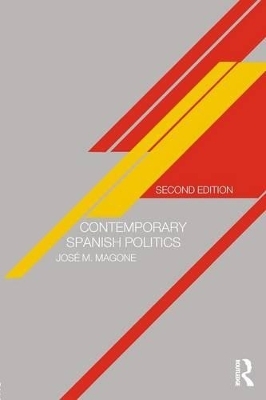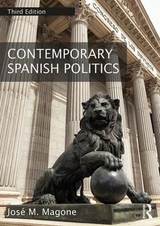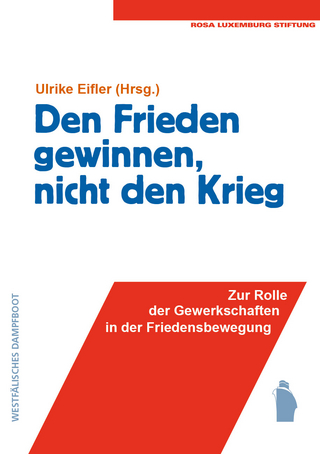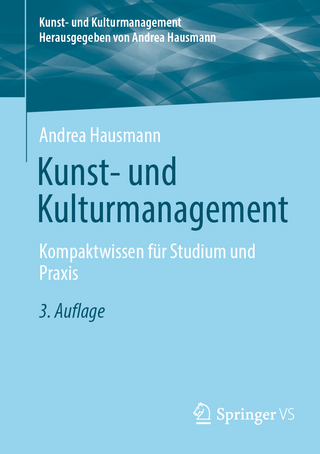
Contemporary Spanish Politics
Routledge (Verlag)
978-0-415-42189-8 (ISBN)
- Titel erscheint in neuer Auflage
- Artikel merken
Having been fully revised and updated to reflect the considerable changes in Spain over the last decade, José M. Magone gives a fresh insight into the formal and informal workings of this dynamic southern European democracy. Thoroughly examining Spain’s historical background, political culture, core political institutions and foreign policy making, each chapter provides a research-based overview of the studied topic which can then be used as the basis for further research by students.
Key themes of the book include:
recent history of Spain after Franco's death
Spain’s political culture, institutional framework and political economy
foreign policy making; the reaction to the global anti-terrorist coalition and the Madrid bombings
policy making process and the system of interest intermediation
party system and electoral process
the dynamics of regional/territorial politics and the Basque problem
external relations with the European Union, the Mediterranean and Latin America
constitutional reform
immigration.
New chapters to this edition:
Interest groups and civil society
Media and Politics
Richly illustrated with maps and biographical details of key actors and presenting large amounts of statistical and quantative data make this book an indispensable source of information for students, academics and the wider public interested in Spanish politics.
José M.Magone is Professor in Regional and Global Governance at the Berlin School of Economics. He was Reader in European Politics at the University of Hull. Among his publications are Politics of Southern Europe (2003), The Developing Place of Portugal in the European Union (2004), The New World Architecture (2006)
1. The Transformation of Spanish Politics: A Review of the Historical Legacy 1.1 The rise and decline of the Spanish empire: the politics of the ancient regime (1492-1814) 1.2 The discontinuous road to democracy: from constitutional monarchy to the Spanish Civil War (1814-1939) 1.2.1 From absolutist to constitutional monarchy(1814-74) 1.2.2 Rise and fall of the restoration system (1874-1923) 1.2.3 The dictatorship of Miguel Primo de Rivera (1923-1931) 1.2.4 The Second Republic and the Civil War (1931-39) 1.3 From authoritarianism to restoration of democracy 1.3.1 The legacy of authoritarianism (1939-75) 1.3.2 The Spanish transition to democracy (1975-82) 1.3.3 The politics of patrimonial socialism:the Spanish Socialist Workers’ Party in power(1982-96) 1.4 Alternation in power: the politics of José Maria Aznar(1996-2004) 1.5 The 2004 elections and the Emergence of the Socialist government under José Luis Zapatero 1.6 Conclusions 2. The Main Features of Contemporary Political Culture 2.1 Social change and moderation of Spanish Politics 2.2 Satisfaction with national democracy and institutional disaffection 2.3 Secularization of society:the consolidation of the non-denominational state 2.4 Multiple identities: local, regional and national."Patriotic Constitutionalism" and Federalism 2.5 Decline of institutionalized mobilisation and the rise of cognitive sporadic mobilisation 2.6 Support for European Union integration 2.7 Challenge to Spanish society and political culture:the growing importance of immigration 2.8 Conclusions 3. The Core Spanish Institutions 3.1 The Thirtieth Anniversary of the Spanish Constitution and its Sacred Nature 3.2 The monarchy as main pillar of Spanish democracy 3.3 The presidentialisation of the Prime Minister 3.4 Executive-Legislative Relations: an asymmetrical partnership 3.5 Governmental longevity and political corruption: From socialist patrimonialism to Aznarism 3.6 The postponed reforms of the judiciary 3.7 Accountability andtransparency:The controlling institutions 3.8 Public Administration: democratisation and decentralisation 3.9 Conclusions 4. Political Parties and Elections 4.1 The rules of the game:the centrality of governmentability and stability 4.2 The political parties in Spain 4.2.1 Legislation and public party financing 4.2.2 People's Party (PP):the long road towards the centre 4.2.3 Spanish Socialist Workers'Party (PSOE):reinventing the left 4.2.4 United Left (IU):the inevitable decline 4.2.5 Covergence and Union (CiU): a regionalist party in transition 4.2.6 The Basque Nationalist Party (PNV): the politics of moderate nationalism 4.2.7 Other regionalist-nationalist parties 4.3 Multilevel electoral arenas 4.3.1 The legislature election:the growing concentration of the vote 4.3.2 Local elections and autonomous community elections:second order elections 4.3.3 The European Parliament elections:third-order elections? 4.4 Conclusions:the moderation and Americanisation of Spanish politics 5. The Dynamics of Regional Politics 5.1 The Process of regionalisation since 1978 5.1.1 The development of the state of autonomies 5.1.2 The institutionalisation of intergovernmental relations between the central government and the regions 5.1.3 The transfer of powers from central government to the autonomous communities 5.2 The regional political systems 5.2.1 Regional governments 5.2.2 The regional party systems 5.3 Political developments in Catalonia: From Jordi Pujol to Pascual Maragall 5.4 Moderation vs. Radicalism in the Basque Country: The strengthening of the national parties 5.5 Emerging nationalism in Galicia: the end of the Manuel Fraga era, the emergence of the Socialist Party and the tensions within the National Galician Block 5.6 The Dominance of the Socialist Party in Andalusia: The Problem of Underdevelopment 5.7 Conclusions: The future of regionalism 6. Media and Politics 6.1 The transformation of the media landscape in Spain 6.2 The printed press:shaping politics and civil society 6.3 The broadcasting sector: From monopoly to pluralism 6.4 The importance of regional broadcasting 6.5 The growing importance of the internet 6.6 The political economy of the multi-media landscape in Spain 6.7 Conclusions:The Marketization of the Media Landscape 7. Interest Groups and Spanish Civil Society 7.1 The growing importance of interest groups in Spain 7.2 The business organisations:the quest for unification 7.3 The trade union confederations:problems of unionization 7.4 The farmers’ organisations 7.5 The institutions and practice of interest intermediation 7.6 The Catholic Church 7.7 Non-governmental Organisations:the rise of Spanish civil society 7.8 National interest group representation in the European Union 7.9 Conclusions: The accommodation of diversity in Spain 8. A Semiperipheral Economy 8.1 The Development of the Spanish Economy since the 1960s 8.2 From Francoism to the Maastricht Treaty 8.3 EMU, macroeconomic policy and stability pacts 8.4 The centrality of labour market policy and the social partners 8.5 Challenges for the Spanish economy 8.6 Conclusions: The continuing problems of a semiperipheral economy 9. The Policy Making Process: The Impact of the European Union 9.1 Policy style and European Integration 9.2 The Spanish Contribution to European Integration since the 1990s 9.3 National coordination of European public policy in a multi-level governance system: the growing importance of the autonomous communities 9.4 The structural funds and Spanish public policy 9.5 Reform of agricultural and fisheries sector 9.6 Welfare state policies:education, health and social policy 9.7 The European Union and environmental policy 9.8 Conclusions 10. Spanish Foreign policy within the European Union 10.1 The imperative of the European Union for Spanish Foreign Policy 10.2 Spanish European policy (1986-2008) 10.3 The Spanish Presidencies of the European Union in 1989,1995 and 2002 10.4 The priority areas of Spanish Foreign Policy 10.4.1 Morocco:A Difficult Relationship 10.4.2 The Mediterranean:The Euro-Mediterranean Partnership 10.4.3 Latin America: The cultivation of Hispanidad,Ibero-American summits and Mercosur 10.4.4 Spain and its European Neighbours:Portugal,France and Italy 10.5 Contribution of Spain to Peacekeeping Forces 10.6 September 11 and the fight against terrorism: the Spanish contribution 10.7 Conclusions: The lacking economic foundations of a ambitious nation 11. The quality of Democracy in Spain: Some concluding remarks
| Erscheint lt. Verlag | 20.10.2008 |
|---|---|
| Zusatzinfo | 135 Line drawings, black and white; 4 Halftones, black and white; 41 Tables, black and white; 139 Illustrations, black and white |
| Verlagsort | London |
| Sprache | englisch |
| Maße | 156 x 234 mm |
| Gewicht | 1021 g |
| Themenwelt | Sozialwissenschaften ► Politik / Verwaltung |
| ISBN-10 | 0-415-42189-6 / 0415421896 |
| ISBN-13 | 978-0-415-42189-8 / 9780415421898 |
| Zustand | Neuware |
| Haben Sie eine Frage zum Produkt? |
aus dem Bereich



